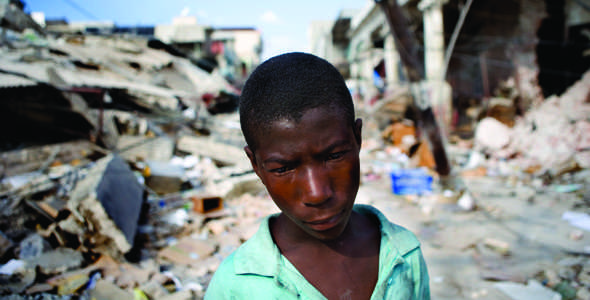40% of Haiti had clean drinking water before the massive earthquake hit.
Freshman Mosley Pape knows all about the old Haiti, now he’s learning the nightmare of post-earthquake Haiti.
“My sisters are all right, but they are the only ones I know about right now,” Pape said. “I am still unsure about my brother and dad.”
Pape is not alone. The streets, that were already horrible in the first place, are now nearly non-existent. An already suffering nation is being forced to go by the natural law of Darwin — survival of the fittest.
“They don’t have the basic needs to survive,” Katrina Farmer, executive director of the North Central Texas chapter of the America Red Cross, said. “They will have to be supported by the world.”
The biggest needs currently in Haiti are what’s a given here including food, water, and shelter.
“This is a mass care situation, not an individual,” Farmer said. “It’ll take them years to recover.”
The American Red Cross has already directed $200 million toward the matter, $35 million being from the $10 text message charges.
“[The Red Cross] are checking with the people on the ground and making sure the money is spent correctly and directly,” Farmer said. “The important thing to know is that [help for Haiti] really needs to be monetary donations. Let the large aid organizations do the work.”
Evangel Temple pastor Kile Bateman sees Haiti as his second home.
“My wife and I have been there close to 30 times over the last 10 years,” Bateman said. “We adopted our two children from there.”
Bateman said he and his wife have always supported Haiti.
“When we heard the news, our first reaction was ‘what can we do’,” Bateman said. “I wanted to be there the moment it happened.”
Bateman said Haiti was nowhere near prepared enough for this.
“It is a logistical nightmare everyday in Haiti,” Bateman said. “It’s hard to know who to blame for [the lack of readiness].”
Evangel Temple has a relationship with a mission located in Haiti called the Mission of Hope. The mission was not affected by the earthquake.
“It’s amazing because [the mission] is located at a point where it should have been annihilated,” Bateman said. “We believe the hand of God was on them.”
Within the next few weeks, Evangel Temple will have a medical team set off to provide aid.
“We’ll probably be one of the first teams there,” Bateman said. “By the time we get there people are going to be dying from diseases that were not treated.”
Bateman said they will have to be prepared for anything and everything.
“I know that I’ll be doing funerals,” Bateman said. “I know of family members that have had loved ones thrown into the trash dump that never got a decent, respectable memorial service.”
The Haitian people have been the “victims of a corrupt government for generations, but yet they overcome it.”
“Conditionally, if you live in an environment like that you have to suffer and learn how to manage through tough times as normal times,” Bateman said. “They are the most loving, loyal, and passionate people.”
Bateman wants to make sure people don’t listen to someone who hasn’t been there.
“Don’t believe what you hear when they say [Haiti] is cursed and evil,” Bateman said. “I tell the people that go to Haiti ‘you will see hell, but you will also see heaven’.”
Freshman Mosley Pape remembers vividly what life was like in Haiti before he was adopted and brought to America.
“Where I was in an orphanage we didn’t have a bed,” Pape said. “Everybody had to sleep on the hard floor.”
Pape said he is very grateful for the opportunity he had been given.
“I’m very lucky to come here,” Pape said. “There’s a lot of things that I have that they don’t have like a home, room for my own, electricity, an opportunity to play sports, and three to four meals a day when they are lucky to have one or two.”
Pape hopes to return to Haiti some day.
“Hopefully I can change their lives,” Pape said. “And give them an opportunity of education that my adopted parents gave me.”
More than 200,000 lives were lost, and two million left homeless. Pape said he’s learned from the tragedy.
“Just be happy with what you have,” Pape said. “Don’t take it for granted because any day it can be taken away.”
From the first day Pape arrived in America, his life was changed.
“People in Haiti are living in the streets now,” Pape said. “It bothers me a little bit because it could have been me in there.”

